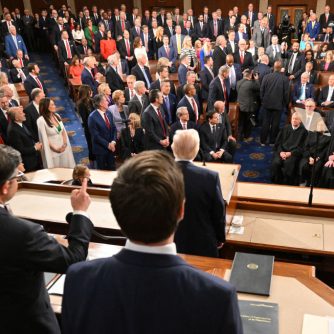On this episode of Carolina Newsmakers, Don Curtis interviews Bob Phillips, Executive Director of Common Cause North Carolina, about the outcomes of the 2024 elections and the challenges facing democracy in the state and nationwide. Phillips provides insights into voter turnout, the role of money in politics, and the importance of nonpartisan advocacy.
Phillips begins by reflecting on the 2024 elections, highlighting the surprising margins in many races, both nationally and in North Carolina. He notes that North Carolina continues to be politically divided, with urban areas leaning Democratic and rural and exurban areas favoring Republicans. He emphasizes the importance of engaging unaffiliated voters, the largest voter registration group in the state, as their preferences often decide close races.
Discussing voter turnout, Phillips praises North Carolina’s strong participation, with 73% of registered voters casting ballots. He commends the resilience of voters in western North Carolina, who overcame significant challenges from recent natural disasters to ensure their voices were heard. However, he highlights disparities in turnout among Democratic strongholds like Mecklenburg and Cumberland counties, suggesting that underperformance in these areas cost Democrats key statewide races.
Phillips also touches on the close contests for Council of State positions, such as attorney general and state treasurer, which were decided by narrow margins. He praises the state’s election system for its fairness and transparency, noting that despite the contentious political climate, the elections were conducted without significant issues.
The conversation shifts to the influence of money in politics, with Phillips expressing concern about the growing role of super PACs and “dark money” in campaigns. He advocates for greater transparency in campaign finance to ensure voters understand who is funding political ads and why. Phillips also discusses the impact of media fragmentation, noting that the decline of local news coverage has created “news deserts,” where citizens lack access to reliable information about their government.
Phillips emphasizes the mission of Common Cause North Carolina to promote open, honest, and accountable government. He highlights the organization’s work on voting rights, redistricting reform, and increasing transparency in campaign finance. He argues that bipartisan collaboration is essential to address these issues and strengthen democracy.
Looking ahead, Phillips shares his optimism about North Carolina’s potential, particularly in fostering economic growth and addressing disparities in rural areas. However, he voices concerns about national trends, including polarization and the influence of artificial intelligence in spreading misinformation during campaigns. He calls for proactive regulation to address these challenges and protect the integrity of elections.
In closing, Phillips stresses the importance of citizen engagement in holding elected officials accountable. He urges North Carolinians to stay informed and actively participate in the democratic process to ensure a government that serves the people effectively.





